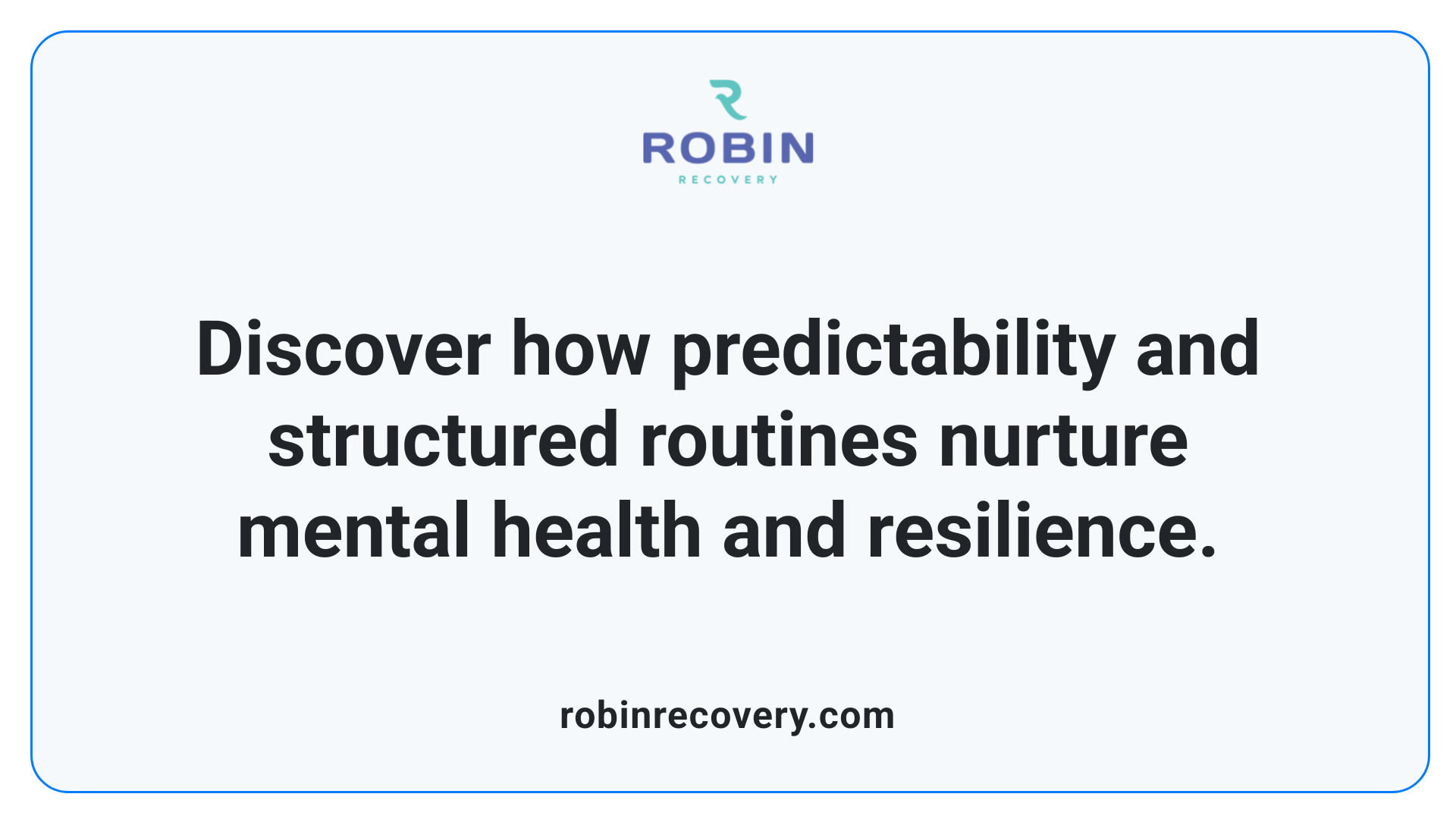The importance of creating a structured daily routine

Understanding the Power of Daily Structures
Establishing a structured daily routine is fundamental to fostering overall health, mental stability, and emotional resilience. It’s more than just organizing schedules; routines provide a foundation upon which individuals of all ages can build healthy habits, manage stress, and achieve their personal and collective goals. This article explores the multifaceted importance of routines, offering insights into their benefits, strategies for development, and their critical role in mental health and well-being.
The Role of Routine in Enhancing Overall Health and Well-Being

What is the importance of creating a structured daily routine for overall health and well-being?
Establishing a consistent routine is essential for maintaining good health and mental resilience. One of the primary benefits is regulating the circadian rhythm, which is our body's internal clock that governs sleep-wake cycles. When we follow regular sleep and wake times, sleep quality improves, contributing to better mental clarity and emotional stability.
A structured routine also offers psychological stability. Knowing what to expect each day reduces feelings of being overwhelmed or lost. It fosters a sense of progress and control, which can significantly decrease stress and anxiety. Having set times for meals, exercise, work, and relaxation ensures that vital activities are prioritized without constant decision-making, thereby reducing mental fatigue.
Moreover, routines support the development of healthy habits such as eating balanced meals, scheduling regular physical activity, and taking breaks for self-care. These habits not only promote physical health but also improve mental health by lowering stress levels and increasing energy.
Incorporating social interactions and short recoveries within routines can elevate mood, enhance productivity, and aid in stress management. When routines are personalized and flexible enough to accommodate individual needs and circumstances, they are more sustainable and effective.
In essence, a well-designed daily routine acts as a foundation that fosters both physical and mental well-being. It helps embed positive behaviors into daily life, making healthy choices easier and more automatic, ultimately leading to a balanced, healthier lifestyle.
Predictability, Structure, and Mental Health

Why is predictability and structure important for mental health?
Maintaining a predictable daily routine provides a foundation of stability and control, which are essential for mental well-being. Structured routines help reduce feelings of uncertainty and chaos, especially during stressful periods. When individuals know what to expect and have a clear plan for their day, it decreases stress and anxiety levels.
Having a routine fosters focus and enhances productivity. It also builds confidence and self-esteem as individuals experience a sense of achievement from successfully completing daily tasks. This consistent sense of accomplishment boosts resilience, making it easier to cope with challenges.
Sleep plays a vital role in emotional health, and routines that include regular sleep and wake times significantly improve sleep quality. Better sleep contributes to better mood regulation, higher mental clarity, and emotional stability.
Routines promote healthier habits such as engaging in physical activity, maintaining a balanced diet, and practicing relaxation techniques. These habits contribute to overall mental and physical health, reinforcing a positive cycle of well-being.
During difficult or uncertain times, routines act as a stabilizing buffer, offering comfort and a sense of security. They create a familiar structure that can help individuals manage stress, avoid rumination, and foster resilience.
In summary, establishing predictable and well-structured routines supports mental health by reducing stress, improving sleep, reinforcing positive habits, and building resilience when facing adversity.
Physical and Dietary Benefits of Consistent Routines

How do routines improve sleep quality, promote healthy eating, and encourage physical activity?
Establishing consistent daily routines plays a crucial role in enhancing overall health by creating a predictable structure for sleep, nutrition, and exercise. When routines are adhered to regularly, they help regulate the body's internal clock, or circadian rhythm, which governs sleep-wake cycles. This regulation leads to better sleep quality, allowing for restorative rest that boosts mental sharpness and emotional well-being.
In addition, routines that include scheduled meal times support healthier eating habits. Planning meals ahead of time reduces impulsive choices, encourages balanced nutrition, and minimizes reliance on unhealthy convenience foods. Consistent meal schedules also prevent late-night snacking and help maintain optimal energy levels throughout the day.
Physical activity is more likely to be incorporated into daily life when part of a routine. Whether it's morning yoga, midday walks, or evening workouts, regular scheduled exercise improves physical fitness and mental health. Exercising earlier in the day can further enhance sleep quality by promoting the release of natural sleep hormones like melatonin and reducing anxiety.
Stress management is also intertwined with routines. Physical activity decreases stress hormones, helping to lower anxiety and improve mood, which in turn fosters better sleep and healthier habits overall.
Practicing good sleep hygiene—such as creating a cool, dark, and quiet environment, maintaining a consistent sleep schedule, and engaging in relaxing bedtime rituals—further supports restful sleep. Similarly, routines that incorporate mindful eating, regular physical activity, and stress-reducing practices collectively contribute to improved physical and mental health.
Overall, predictable daily patterns reinforce healthy behaviors, foster emotional stability, and support the body's natural rhythms, leading to a healthier, more balanced life.
Routines and Family, Children, and Seniors

What are the benefits of routines for children, seniors, and families?
Establishing routines provides numerous advantages across all age groups, fostering stability, safety, and predictability. These benefits are especially vital during times of uncertainty or change, as routines serve as a foundation for emotional and physical well-being.
For children, routines support social and emotional development by creating a consistent environment that develops trust and security. They encourage independence and help children learn self-care skills, such as hygiene and proper nutrition. Consistent routines—such as regular bedtimes and meal schedules—also promote better sleep habits and academic success.
Seniors benefit from routines that help maintain their independence and cognitive function. Regular schedules for activities like exercise, meals, and social interaction prevent confusion and agitation, particularly for individuals with memory issues like Alzheimer’s disease. These structured routines contribute to emotional stability and foster a sense of control.
In families, routines strengthen bonds through shared activities, such as family dinners, morning rituals, or bedtime stories. These shared moments promote a sense of belonging, reduce conflicts, and enhance communication.
Overall, routines create an organized environment that reduces stress and anxiety, enhances emotional well-being, and supports healthy development at every life stage.
Practical Strategies for Developing and Sustaining Routines

What are practical tips and techniques for developing effective daily routines?
Creating consistent routines can significantly improve overall health and mental well-being. One of the first steps is to set clear, attainable goals. Instead of overloading your schedule, start small by incorporating manageable habits, such as waking up at the same time each day or preparing meals ahead of time. This incremental approach helps sustain long-term habits.
Using planning tools like checklists, calendars, or habit trackers can keep you organized and motivated. These tools allow you to monitor your progress and make adjustments as needed. Scheduling activities during your peak energy times ensures consistency and maximizes effectiveness.
Flexibility is also essential. Life changes and unforeseen circumstances can disrupt routines, so allowing room for adjustments helps prevent frustration. Incorporate free time within your schedule to relax and reset, which reduces stress and enhances motivation.
Celebrating small wins and focusing on emotional progress reinforce positive behavior. Recognize achievements, no matter how minor, to build confidence.
Support systems and accountability play a vital role. Sharing your goals with friends or family encourages encouragement and commitment. Showing compassion to yourself during setbacks helps maintain motivation and resilience.
By combining these strategies—goal setting, planning, flexibility, and support—you can develop effective routines that promote sustained well-being and mental clarity.
Embracing Routine for Long-Term Well-Being
The integration of routine into daily life is not merely about discipline but about fostering a sense of stability, control, and purpose. Routines empower individuals and families to manage their health proactively, reduce stress, and create an environment conducive to growth and happiness. While initial efforts may require patience and adaptability, the benefits—improved sleep, mental health, physical well-being, and stronger relationships—are enduring. Embracing the importance of structured daily routines can lead to a more balanced, productive, and fulfilling life, making routine a cornerstone of long-term health and happiness.
References
- The Importance of Creating Habits and Routine - PMC
- Health Benefits of Having a Routine - Northwestern Medicine
- The Importance of Keeping a Routine During Stressful Times
- The Psychological Benefits of a Structured Routine - Humantold
- The Power of Structure: How Routine and Discipline Improve Focus ...
- What is structured routines importance? – Focuskeeper Glossary
- Benefits of Establishing a Daily Routine - Effective School Solutions
- The Importance of Routines. Organizing your life around habits that…
- How to Create Structure in Your Life and Daily Routine
- The Importance of Schedules and Routines | HeadStart.gov
